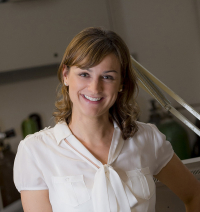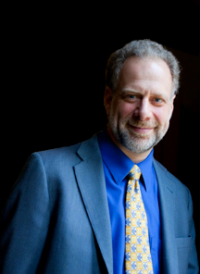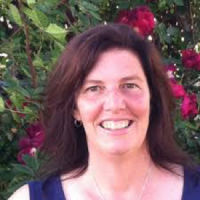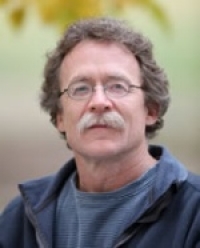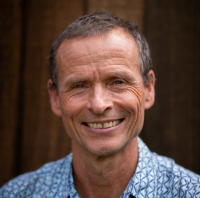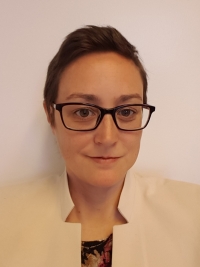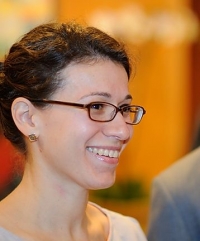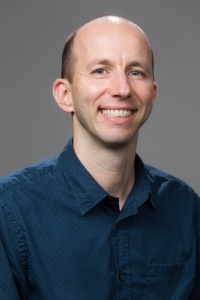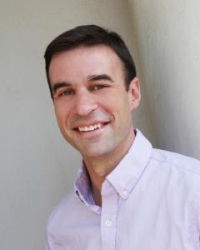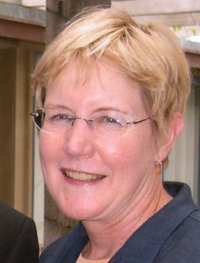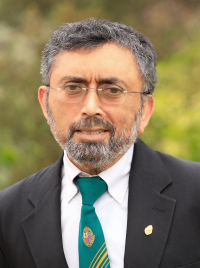The Evolution of Human Physical Activity
Biographical Sketches: Co-Chairs
UC San Diego School of Medicine
Tatum Simonson is an Associate Professor and the John B. West Endowed Chair in Respiratory Physiology in the Division of Pulmonary, Critical Care, Sleep Medicine, and Physiology at UC San Diego School of Medicine. Dr. Simonson applies integrative physiological genomics approaches to understand systems-level responses to hypoxia in highland populations. Her research provides evidence for genetic adaptations to high altitude and associations among these factors, molecular functions, and physiological traits. In addition to her research in the highlands of Tibet and Peru, her team studies natural variation in human responses to low oxygen and aims to understand the contributions of genetic and epigenetic factors to variation in hypoxia-related disease states (e.g., altitude illness, sleep apnea, and cardiopulmonary diseases). These and related interdisciplinary efforts are coordinated through the Center for Physiological Genomics of Low Oxygen (CPGLO) at UC San Diego.
Harvard University
Daniel Lieberman is the Edwin M. Lerner II Professor of Biological Sciences in the Department of Human Evolutionary Biology at Harvard University. He received degrees from Harvard and Cambridge University, and taught at Rutgers University and George Washington University before joining the Harvard Faculty in 2001. Lieberman’s research, which focuses on the evolution of human physical activity, combines experimental biomechanics, anatomy, and physiology both in the lab and in the field, and he has conducted research in Africa for almost 30 years, and now also works in Mexico. He loves teaching and has published over 150 papers, many in journals such as Nature, Science, and PNAS. He is best known for his research on the evolution of the head and on the evolution of running, which he also enjoys doing himself. He has published two books, The Evolution of the Human Head (2011), and The Story of the Human Body: Evolution, Health and Disease (2013). He forthcoming book is on the evolution of human physical activity.
Biographical Sketches: Speakers
UC San Diego
Ellen Breen is part of the Research Faculty in the Section of Physiology, Division of Pulmonary Critical Care and Sleep Medicine, Department of Medicine at the University of San Diego, California. Her research has focused on the molecular biology and physiology regulating the oxygen transport system. In particular she has focused on the interaction of the lungs, skeletal muscle and brain to provided sufficient oxygen during exercise and how these systems are compromised in many chronic diseases, such as chronic obstructive pulmonary disease. Recently, she started studying a very interesting evolutionary change in Hominins that took place about 2 million years ago. This involves the expression of the gene for CMP-Neu5Ac Hydroxylase (CMAH). Other primates express CMAH but due to a genetic mutation humans lost this hydroxylase which modifies a cell surface sugar, sialic acid. Her recent studies show that replicating this biochemical change in mice leads to remarkable improvement in endurance exercise capacity, mitochondrial function and overall oxygen utilization.
University of Utah
David Carrier is a Professor in the School of Biological Sciences at the University of Utah. He is a comparative biomechanist interested in the ways in which the demands of movement have influenced the evolution of the anatomy, physiology, and behavior of terrestrial vertebrates.
UC San Diego
Pascal Gagneux is CARTA's Executive Co-Director, a Professor of Pathology and Anthropology, and the Department Chair of Anthropology at UC San Diego. He is interested in the evolutionary mechanisms responsible for generating and maintaining primate molecular diversity. The Gagneux laboratory studies cell-surface molecules in closely related primates species. His focus is on glycans, the oligosaccharides attached to glycolipids and glycoproteins of the surfaces of every cell and also secreted into the extra-cellular matrix. Gagneux's laboratory is exploring the roles of molecular diversity in protecting populations from pathogens as well as potential consequences for reproductive compatibility. Dr. Gagneux’s interest is in how glycan evolution is shaped by constraints from endogenous biochemistry and exogenous, pathogen-mediated natural selection, but could also have consequences for sexual selection. Dr. Gagneux has studied the behavioral ecology of wild chimpanzees in the Taï Forest, Ivory Coast, population genetics of West African chimpanzees, and differences in sialic acid biology between humans and great apes with special consideration of their differing pathogen regimes. In 2011, while Associate Director of CARTA, Dr. Gagneux helped to establish a graduate specialization in Anthropogeny at UC San Diego. This wholly unique graduate specialization is offered through eight participating graduate programs in the social and natural sciences at UC San Diego.
West Virginia School of Osteopathic Medicine
Jandy Hanna is a Professor and Associate Dean in the Research and Sponsored Programs department at the West Virginia School of Osteopathic Medicine (WVSOM). Hanna is a functional morphologist and comparative primate anatomist. She studies primate evolution, with a focus on the biomechanical features of primates during vertical climbing. The evolution of bipedalism in the human lineage is thought to be related to biomechanics found during vertical climbing; however, little is known about how parameters like size, limb length, and phylogenetic history affect the biomechanics. Her work seeks to determine how differentiation between the forelimb and hindlimb during climbing may have contributed to the evolution of obligate bipedalism in humans.
Jagiellonian University
Grazyna Jasienska, Ph.D., a Professor and Department Chair at Institute of Public Health, Jagiellonian University, Krakow, Poland, where she is a biological anthropologist whose research interests include reproductive ecology, human fertility, life history, and implications of evolutionary biology for medicine and public health. She is the author of The Fragile Wisdom: An Evolutionary View on Women’s Biology and Health (Harvard Univ. Press, 2013). Jasienska established the Mogielica Human Ecology Study Site in rural Poland where her team conducts longitudinal projects on human life history, fertility and health. Recently, she was involved in the Lancet series on the evolutionary public health, the topic that for the first time was covered by one of the most prestigious medical journals. Jasienska's work has been published in, among others, the Lancet, PNAS, Proceedings of the Royal Society, Biological Reviews, American Journal of Human Biology. She received a MA and PhD in biological anthropology from Harvard University and MSc in biology from Jagiellonian University. She was a fellow at the Radcliffe Institute for Advanced Studies, Harvard University. She is founder and president of the Salus Publica Foundation for Public Health which supports research and aims to improve quality of life in rural communities.
University of Pennsylvania
Yana Kamberov joined the Departments of Genetics and Dermatology at the University of Pennsylvania Perelman School of Medicine in 2016. Her lab's research focuses on the genetic mechanisms governing the development and evolution of the skin and its appendages, with a special focus on the genetic basis for the evolution of thermoregulatory skin traits of humans. Yana is a graduate of the University of Pennsylvania from which she received her Bachelor's degree in Biology and Anthropology. She received her Ph.D. in Cell and Developmental Biology from Harvard University. Upon completing her doctorate Yana trained as a post-doc in the lab of Cliff Tabin in the Genetics Department of Harvard Medical School under the co-mentorship of Pardis Sabeti (Harvard University, HHMI), Daniel Lieberman (Harvard University) and Bruce Morgan (Harvard Medical School and MGH).
Duke University
Herman Pontzer is Associate Professor of Evolutionary Anthropology at Duke University. Through lab and field research, he investigates the physiology of humans and apes to understand how ecology, lifestyle, diet, and evolutionary history affect metabolism and health. He is also interested in how ecology and evolution influence musculoskeletal design and physical activity. Field projects focus on small-scale societies, including hunter-gatherers and subsistence farmers, in Africa and South America. Lab research focuses on energetics and metabolism, including the development of new methods for measuring energy expenditure, physiology, and metabolic health in the field.
University of Southern California
David Raichlen is a Biological Anthropologist interested in the origins and evolution of the human lineage. He received a B.S. from Duke University in 1998. He received his M.A. in 2000 and his Ph.D. in 2004 from the University of Texas at Austin. He joined the University of Arizona in 2006 as an Assistant Professor. In 2019, he moved to the Human and Evolutionary Biology Section of the Department of Biological Sciences at the University of Southern California. His research examines the links between human evolution, physical activity, and health across the lifespan. His work in evolutionary physiology explores how movement and physical activity drove key aspects of human evolution, helping to explain how and why inactivity underlies many chronic diseases today. Combining biomechanics, physiology and neuroscience, and building on reconstructions of movement and exercise patterns in ancient human ancestors, his work suggests a full understanding of our evolutionary history can help explain how and why our current, more sedentary lifestyle impacts our physical and mental health, and how we can use this evolutionary context to improve well-being today. His current research is focused on understanding how and why exercise and physical activity benefits brain structure and cognitive function, especially in older adults.
UC San Diego
Margaret Schoeninger is Distinguished Professor Emerita of Anthropology at UC San Diego, a Research Archaeologist in the Glenn Black Laboratory of Archaeology at Indiana University, and Emerita Co-Director of CARTA. She has done fieldwork in North America, Mexico, Pakistan, India, Kenya, and Tanzania as well as laboratory research on carbon, nitrogen, and oxygen stable isotope ratio analysis in biological tissues and food component analysis of traditional foods. Her major interest is in the evolution of human diet particularly as it informs our understanding of the appearance and evolution of the human lineage.
UC San Diego School of Medicine
Ajit Varki is a Distinguished Professor of Medicine and Cellular & Molecular Medicine, Emeritus Co-Director of CARTA, Emeritus Co-Director of the Glycobiology Research and Training Center at UC San Diego, and Adjunct Professor at the Salk Institute. He received basic training in physiology, medicine, biology, and biochemistry at the Christian Medical College (CMC), Vellore, The University of Nebraska, and Washington University in St. Louis. He also has formal training and board certification in internal medicine, hematology, and oncology. Varki is the executive editor of Essentials of Glycobiology (Cold Spring Harbor Press, 4th Edition, 2022) and is recipient of a MERIT award from the NIH, and an American Cancer Society Faculty Research Award. Honorific elections include the American Academy of Arts and Sciences, the National Academy of Medicine, the American Society for Clinical Investigation, and the Association of American Physicians. He is also recipient of the three highest honors in his field, the Karl Meyer Award of the Society for Glycobiology, the International Glycoconjugate Organization Award and the Rosalind Kornfeld Award for Lifetime Achievement in Glycobiology. He is recognized for creating the first major open access research journal (J. Clin. Invest., 1996) as well as the first major open access textbook (Essentials of Glycobiology, 2009). He was honored with the Old Cottonian of Eminence Award at the 150th Anniversary of Bishop Cotton Boys School, Bangalore, India, (2015) as well as a Distinguished Faculty Medal and Oration at his medical school alma mater, CMC, Vellore. Significant past appointments include: Co-Head, UC San Diego Division of Hematology-Oncology; President of the Society for Glycobiology; Editor-in-Chief of the Journal of Clinical Investigation; Interim Director of the UC San Diego Cancer Center, President of the American Society for Clinical Investigation, and UC San Diego Associate Dean for Physician-Scientist Training. Varki's research interests are focused on a family of cell surface sugars called sialic acids, and their roles in biology, evolution and disease. Currently, active projects are relevant to the roles of sialic acids in microbial infectivity, the regulation of the immune response, the progression and spread of tumors, aging, and unique aspects of human evolution. His group is particularly intrigued to find multiple interrelated differences in sialic acid biology between humans and our closest evolutionary cousins, the "great apes." These differences are a signature of the events that occurred during the last few million years of human evolution, and appear to be relevant to understanding several aspects of the current human condition, both in health and disease. Varki’s book, Denial (Twelve, Hachette Books, 2013), explores a novel "Mind Over Reality Transition” (MORT) theory that denying reality and personal mortality was a key step in allowing the emergence of a full theory of mind, and in the origin of our species.
